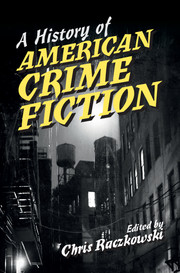Book contents
- A History of American Crime Fiction
- A History of American Crime Fiction
- Copyright page
- Contents
- Contributors
- Acknowledgments
- Introduction
- Part I Early American Era
- Part II Romantic Era
- Part III Realist Era
- Part IV Modernist Era
- Part V Postmodernist Era
- Chapter 16 Unusual Suspects
- Chapter 17 Identity Politics and Crime Fiction
- Chapter 18 Native American Detective Fiction and Settler Colonialism
- Chapter 19 African-American Crime and Detective Fiction
- Chapter 20 Criminal Family Drama before and after The Sopranos
- Chapter 21 Making Murderers
- Chapter 22 Spy Narratives in post-9/11 American Culture
- Chapter 23 Film Noir and Neo-Noir
- Chapter 24 Crime Fiction Television
- Chapter 25 Dead Reckonings
- Index
- References
Chapter 22 - Spy Narratives in post-9/11 American Culture
from Part V - Postmodernist Era
Published online by Cambridge University Press: 27 October 2017
- A History of American Crime Fiction
- A History of American Crime Fiction
- Copyright page
- Contents
- Contributors
- Acknowledgments
- Introduction
- Part I Early American Era
- Part II Romantic Era
- Part III Realist Era
- Part IV Modernist Era
- Part V Postmodernist Era
- Chapter 16 Unusual Suspects
- Chapter 17 Identity Politics and Crime Fiction
- Chapter 18 Native American Detective Fiction and Settler Colonialism
- Chapter 19 African-American Crime and Detective Fiction
- Chapter 20 Criminal Family Drama before and after The Sopranos
- Chapter 21 Making Murderers
- Chapter 22 Spy Narratives in post-9/11 American Culture
- Chapter 23 Film Noir and Neo-Noir
- Chapter 24 Crime Fiction Television
- Chapter 25 Dead Reckonings
- Index
- References
- Type
- Chapter
- Information
- A History of American Crime Fiction , pp. 300 - 312Publisher: Cambridge University PressPrint publication year: 2017



